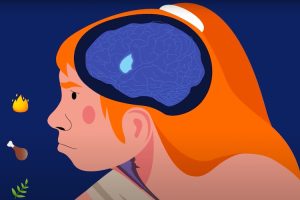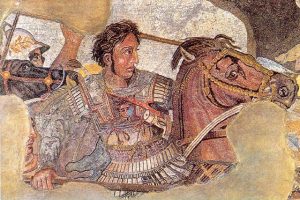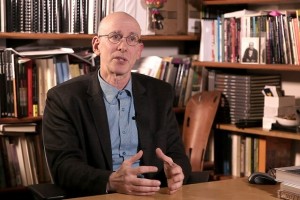Neanderthals
Archeologist Tim Reynolds on Mousterian tools, cross-species interactions, and Neanderthal language
I am going to speak to you about economic growth, about why we are so rich. Once, we were all very poor. It was not that there were some countries that were very rich, like Holland or England, and some that were poor, like Russia or China – everyone was poor. In 1800, the average person in Russia earned the modern equivalent of about two dollars a day. Now imagine getting along in Moscow, or New York, or Beijing on two dollars a day. Now that’s easy to imagine because there are still places down at that level of prosperity. But the good news is that from 1800, 1900, 2000, 2016 income per head in places like England, or Russia, or even China or India, has increased enormously.
The goods and services that the average Chinese person, or the average English person, has in the way of healthcare, housing, food, travel, entertainment, has increased by such big percentages that it’s hard to understand.
A place like England, which in 1800 had an average income of about 6 dollars a day (now remember that it was about two dollars a day in Russia at the time), now has an income of about 110 dollars a day. Six to 110, that’s an enormous improvement in human fulfillment, in human life.
In fact, you can draw a diagram. You can start back at the beginning of the human race in Africa – we are all Africans – and there is three dollars a day, or two dollars a day, and so it goes for two hundred thousand years, goes, goes, and goes. Goes up and down a bit, goes, goes, goes. Around here we have the agricultural revolution, the domestication of plants and animals, it goes up and then goes down again. Because with agriculture you can support more people, so that drives down the average income. So it goes until around 1800. And then it goes like this, goes up at this tremendous rate, completely unprecedented. It had never happened in human history. So the question is, ‘Why?’ Why for this one time in human history did we overcome most of scarcity?
Well, the usual way of talking about the causes speaks of material causes. This is in a way the influence of Adam Smith, but it’s also the influence of Marx. A materialist idea that foreign trade caused it, or exploitation of empires caused it, or capital accumulation, more buildings, more roads, more educated people, or resources, caused it – oil, coal. And in a book that I wrote in 2010, I went through all these explanations, each one. I mean it’s a long book, it’s 500 pages long, so it goes through all of them, one after another.
Is it foreign trade? Is it imperialism, the last stage of capitalism, as Lenin called it? Is it virtuous capital accumulation? Is it the Protestant ethic? Is it institutional change? These are all the suggestions that economists and historians have made over the past two hundred years, while it’s been happening. And my conclusion in that book which is called ‘Bourgeois Dignity’ is that it’s not any of these materialist explanations, but there is something deeper. There is a change in the spirit of some countries that has allowed ordinary people to innovate, to think of new ways of making cars, making automobiles, new ways of growing potatoes, new ways of organizing universities, new ways of organizing science itself. That ordinary people had this opportunity for the first time was the big change.
So in a word, the change in the 18th century starting in North-Western Europe, starting in Holland in the 1600s, then shifting to England and Scotland, and the North American colonies in the 1700s, and then to the wide world in the 19th and 20th century, in a word, in one word – liberalism.
Liberalism against the hierarchy that had dominated agricultural societies since that agricultural revolution. It’s the allowing people, as the English say, ‘to have a go’. In the older societies, and still in a great many societies, hierarchies (men-women, lords-serfs, rich-poor) are frozen in place. And you can’t move, you can’t have a go, you don’t have a chance. So it’s not that there was some rise of entrepreneurship psychologically, it’s not that there were new opportunities for foreign trade. Trade, and commerce, has existed since the beginning of Homo sapiens. It’s not those material things; it’s a political and sociological change. Two items: equality before the law and equality of human honour, human dignity.
So, it’s not mechanical, this modern economic growth; it’s evolutionary.
As long as large numbers of people can try out things and are not stopped by the police, or the law, or the lord – ‘no, you can’t do that, no, you’re just a woman, or you’re black, or you’re a colonial person’ – as long as that doesn’t happen, there is this tremendous enriching. It turns out that the great social discovery of the 19th century is not nationalism, which was and is a disaster, or socialism, which has been another disaster, and if you like those two, national-socialism, but the solution, the discovery was that ordinary people are creative.

Archeologist Tim Reynolds on Mousterian tools, cross-species interactions, and Neanderthal language

Historian Ian Worthington on one of the most significant characters of the Ancient world, Macedonian drinking ...

Professor Mark Jarzombek on what Buddhist temples express, transfer of architectural techniques, and the Euroc...